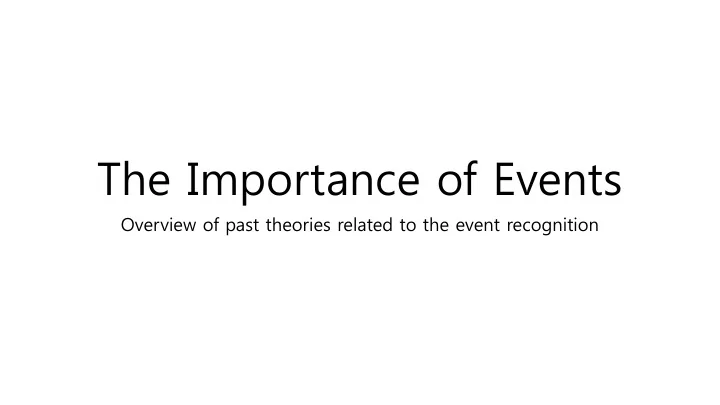

The Importance of Events Overview of past theories related to the event recognition
Definition of Event • Events are what happens to us, what we do, what we anticipate with pleasure or dread, and what we remember with fondness or regret • More precisely: “a segment of time at a given location that is conceived by an observer to have a beginning and an end”
Long Past, Short History • Event cognition has “a long past but a short history” • “memory” usually denotes what you get when you call to mind a previously experienced event.
Integrated Conscious Experience • Our minds and brains process information from an imposing number of sources.
Kant • Kant believed that key aspects of our mental representations of events are determined by some innate categories. • Time • Space • Causality (How events are related to each other)
Gestalt psychology – 3 ideas (1) Psychological theory must deal with wholes or molar units operating at a macroscopic level of functioning
Gestalt psychology – 3 ideas (2) Theories of qualitative differences can be eminently quantitative
Gestalt psychology – 3 ideas (3) Cognition depends on representations that are functionally isomorphic to their parts.
Neobehaviorism (Tolman) • Molar behaviors are an important and appropriate level of analysis(similar to the first idea of gestalt psychology). • Cognitive map(rat’s maze experiment): they were built up a mental representation of the entire environment to which they could refer when presented with various navigational challenges.
Cognitive Psychology
Cognitive Psychology • We propose a central structure called an event model that is an integrated episodic representation of a particular event.
Situation Semantics • The basic components of an event are individuals, the relations among individuals, individuals’ properties, event states, and spatiotemporal locations • Situation semantics proposes that events consist of entities that have features
Situation Semantics • A state-of-affairs is a static configuration of entities and features that is localized in time and space. • A course-of-events is a sequence of states-of-affairs that unfolds over time and is held together by some common attribute.
Embodied Cognition • The embodied cognition hypothesis is that our bodies influence how we think.
Embodied Cognition- M. Wilson’s Idea • Cognition is situated. • Cognition is time-pressured. • Cognitive work can be offloaded onto the environment. • Environment is part of the cognitive system. • Cognition is for action. • Offline cognition is body based.
Cognitive Neuroscience • This suggests that there are specialized neural mechanisms that represent knowledge about how particular events typically unfold. (Ex: Patient who can do individual actions but can’t sequence actions to a coherent larger event as preparing instant coffee)
Mental Models • Mental models are mental representations that act as isomorphs in simulating the structure of the world. • Principle 2 (Finitism ). “A mental model must be finite in size and cannot directly represent an infinite domain.” • Principle 3 (Constructivism). “A mental model is constructed from tokens arranged in a particular structure to represent a state of affairs.”
Mental Models • Principle 4 (Economy). “A description of a single state of affairs is represented by a single mental model even if the description is incomplete or indeterminate.” • Principle 9 (Structural identity). “The structures of mental models are identical to the structures of those states of affairs, whether perceived or conceived, that the models represent.”
Recommend
More recommend